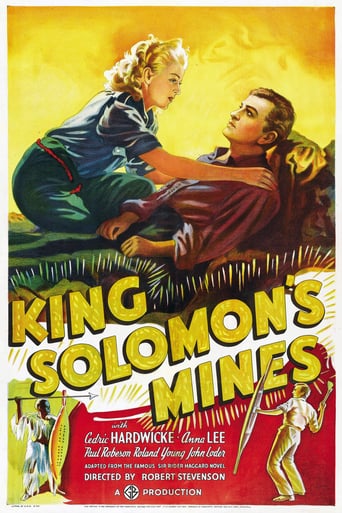dimplet
Note to Thinker: If a movie begins with a semi-naked guy banging a gong, it's a British movie, if with a virgin holding a torch, it's from Hollywood. To spell it out, this is a Gaumont British Picture Corporation picture, studio of Hitchcock's The 39 Steps and The Man Who Knew Too Much (1934), as well as Supersonic Saucer, Transatlantic Tunnel, Mister Hobo, and First a Girl, which all sound absolutely fascinating. They really do. British movies of the 30s generally didn't have the budget or polish of Hollywood productions, and it shows here in the weak editing of early scenes and the slender script. However, they've assembled a first rate cast, except for an annoying Anna Lee. Gaumont did two things you would not have seen in a Hollywood movie of the time: Location shooting in Africa and giving a black man lead billing. It was a joy seeing Paul Robeson starring in a dignified role. And the African footage is probably better done than the studio scenes. Britain had regularly scheduled flying boat routes to Africa carrying British Imperial mail and passengers in luxury, so the producers would have felt more comfortable shooting in Afria than their California counterparts. This is the sort of movie I would have watched as a kid on a black and white TV. The slow pace would have benefited from the commercial breaks -- six minutes an hour back then, unlike today when the movie provides a break from the commercials. As a kid I did not feel compelled to rate everything I watched, but if I did, I would have rated it "It's OK." I wonder if kids could bear to sit through it today?However, there is a reason that adults should watch this, and a way to get kids interested, maybe. King Solomon's Mines (1937) -- and the book -- is the granddaddy of all those adventure, lost world movies, like the Indiana Jones franchise. Watch this and then Indiana Jones and the Last Crusade (1989) back to back. Then consider what they have in common, and you will find the secret formula, kids. (No, I'm not going to spell it out, it's a secret.) As a follow up, ask the kids which is better, and why, and not just the latter's colour and special effects. Now if you really want to get creative, ask the kid to write a story based on the secret formula. Who knows? H. Rider Haggard wrote this story on a five shilling wager with his brother that he couldn't write a story half as good as Treasure Island, which I haven't read lately, so I can't judge whether King Solomon's Mines is, indeed, half as good. No word on whether his brother paid up. But maybe you will raise the next Spielberg. King Solomon's Mines is no gem, but it is historically significant. I have noticed of late (say, the last 15 years or so) many British posters complaining about American movies on the slightest pretext, if they are war movies, because they don't provide sufficient credit to British soldiers for whatever battle is portrayed, and if they are the story of an American horse, that they don't mention British horses (or Australian horses, if the reviewer is an Australian). One British reviewer had the gall to call Seabiscuit "American imperialist propaganda." Perhaps I am missing something here, such as when it was that America became imperialist holders of colonies, and what this has to do with a race horse in the Great Depression?Of course, King Solomon's Mines is not British "imperialist propaganda." Britain is not an imperialist power that holds colonies around the world, and never was. Britain never waged war to protect its colonies against rebellion and revolution, and it certainly never killed innocent, unarmed men, women and children engaged in peaceful protest. Instead, this movie shows how noble and kind these rich British non-imperialists were, at heart, unlike the poor Irishman who would have stolen the treasure map from a dying man, and the poor Irish woman, who was a chronic liar and thief, not to mention the homicidal maniac tribal chief. Umboba was a good man, but then he was educated by the British and knew how to speak English (with a Jersy accent), so he was civilized. But even so, he only was able to gain his rightful throne with the help of the British noblemen. No, King Solomon's Mines is not British imperialistic propaganda. It just fell through a wormhole.This, however, does not solve the problem. The only solution is for Britain to ban the importation and viewing of all American movies, because, according to a consensus of British viewers, they are all "American imperialist propaganda," no matter what they are about. While we are waiting, if you are British, please, please, please stop watching Hollywood movies. You obviously don't enjoy them. May I suggest some classic British gems like: Leave It to Smith, Britannia of Billingsgate, East Lynne on the Western Front, A Cuckoo in the Nest, and Turkey Time?As a footnote, the documentary series Queen Victoria's Empire - 2001 (an excellent programme) has some scenes of traditional African native dancing. It is at night around a campfire, so it is hard to see the details, but the costumes have some of the elements shown in King Solomon's Mines, and the drum rhythms are very similar.
Chris Gaskin
I have just seen this adventure movie for the first time and found it very enjoyable. A hunter and his guide set out across the desert to search for King Solomon's Mines so he can get hold of the treasure. A party, including his daughter who is worried about him follows him and after confronting a dust storm and running out of water, they reach there. Natives find them and after a battle for the throne, the mines are eventually reached and the young woman is reunited with her dad. A volcano erupts and they manage to escape and set off for home, accompanied by 100 natives for the journey across the desert as a thank you for helping the native leader get his throne back.The movie features an excellent performance by Paul Robeson, whose songs help the movie along nicely. This also stars Cedric Hardwicke, Roland Young and Anna Lee. The special effects were good for their time, especially the cave scenes with the volcano.This movie has since been remade several times and the best version is the 1950 one with Stuart Granger, which I also have in my movie collection.This movie is worth checking out. Great fun.Rating: 3 stars out of 5.
Ron Oliver
In darkest Africa, so legends say, lies the secret location of KING SOLOMON'S MINES, a great mountain full of heaps of diamonds. Surrounded by a seemingly impassable desert, it is said no white man has ever set foot there. Africa's greatest hunter & guide, Allan Quartermain, does not believe the mines exist, but he is forced against his better judgment to lead a small party over the desert ... and right into a fierce tribal civil war. This is a very fine adventure film, with much to recommend it. Plenty of excitement, a little romance, and a few well-sung songs help push the plot along. Footage shot in Africa enhance the atmosphere of this Gaumont-British film.Sir Cedric Hardwicke is a sturdy, stoic Quartermain, just the sort of no-nonsense fellow you would want guiding your expedition. American opera star Paul Robeson has marvelous presence as a mysterious native who seems to know a bit too much about the lands they are seeking. Arthur Sinclair & Anna Lee are the two Irish treasure seekers who spark much of the action. John Loder & Roland Young (very droll) nicely play the two English chaps who finance the trek. Robert Adams is the nasty tribal usurper who gets in their way.Strangely receiving no screen credit, stage actress Sydney Fairbrother is nothing short of terrific as the ancient, filthy witch doctor Gagool, `older than the memory of the oldest man.' The scene in which she stalks about, calmly choosing those to instantly die, is a classic of mounting terror.Mr. Robeson uses his magnificent voice in three songs: `Walk! Walk!', `Climbin' Up' & `Kukuwana'.




